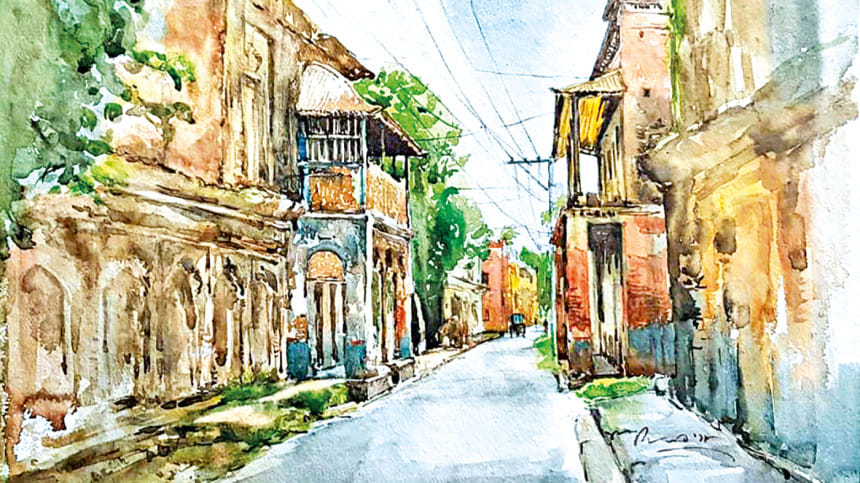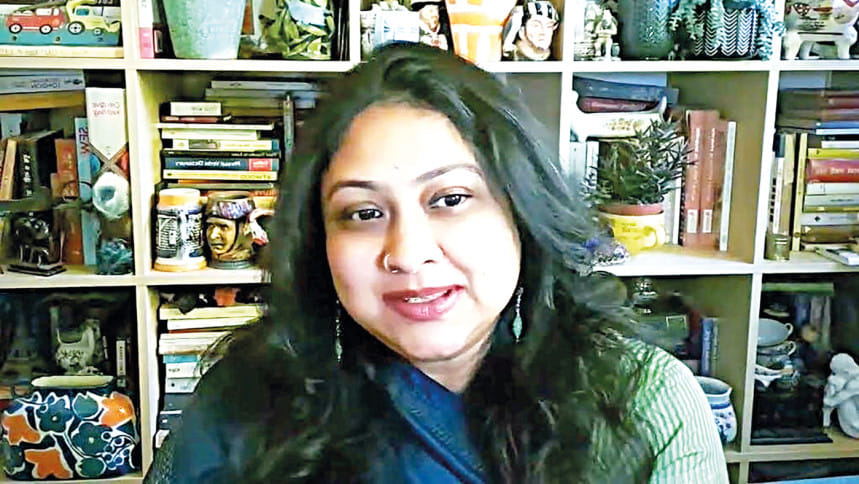Tracing the Roots

My life as a girl child in Dhaka was a lonely one; no community park to go to play in, just an all-enveloping pressure from parents, to excel academically. In those days, our parents kept a cage for dolls and toys to gather dust, which they called a show-case.
When I look back to find the definitive moment when my writing habits took root, I can't find it. It is a distant vanishing point from which everything radiated, or maybe there was not a single point or node from where it all began. Maybe it was amma who started it, by telling us about her aunts-- the proverbial seven sisters who needed to cry over trivial issues to bring the rain in monsoon; by teaching me the name of the muslin-fine rain called 'Eelshe-guri,' the rain that allowed the fishermen to catch eelish/hilsha fish. We did not have gadgets in those days, just a cackling radio and a black and white television entombed inside a wooden shuttered box. So we had stories. Why was there a purple fatty layer of meat under the hilsha fish's skin? Oh, it's because the deer lost a race with the fish and had to offer a pound of flesh, venison to the fish. The golden oriole was supposed to marry the moon, had the ritualistic pre-wedding turmeric shower too, but the wedding did not take place, so she roamed around with a yellow turmeric-smeared body. Those tears of seven sisters, those races between animals, and those unfinished wedding rituals merged like little trickles of streams in my bloodstream. With so many fictional explanations around, why - anybody could become a writer! The radio broadcast Madankumar-Madhumala's songs, how their royal beds interchanged one night. BTV showed programmes like 'Hiramon' (talking birds belonging to the queens), that portrayed folk tales. By the time our TV became coloured, it brought us Shelley Duvall's 'Faerie Tale Theatre,' a fantasy anthology. Stories rained down! So not only were the subterranean streams connecting and joining forces, they were rainwater that seeped through the crevices of my mind.

My life as a girl child in Dhaka was a lonely one; no community park to go to play in, just an all-enveloping pressure from parents, to excel academically. In those days, our parents kept a cage for dolls and toys to gather dust, which they called a show-case. However, books very quickly became my toys, and my eloquent playmates. Our verandas were large and wide; I remember devouring Anandamela, my favourite children's periodical in my leisurely hours there, and sometimes staring at the simulacra made in the walls and cornices by algae-lichen-efflorescence for hours. Books were my time-machines, my confederates, my counsellors. Once books started talking, I started responding too. At first I just coloured the illustrations of people I loved (Alexander Beliaev's Amphibian Man was frog-green) and pinched the names of people I hated in the pages until they made holes. Nobody could ever say I was devoid of passion. Soon, painting and pinching were not enough, I needed to talk back. So I started writing.
My first stories from primary school had too many characters with rhyming names; well, Radio Bangladesh played endless sessions of requested songs and the trail of requesters' names always rhymed, so - I rest my case there. Those stories did not have discernible goals either, nothing fruitful ever really happened in them. But it made me giddy with pride if I could come up with a memorable simile or a metaphor. At school, I was inattentive, my habit of drawing and reading story books during lessons was unquenchable. Here I should mention my nana, amma's father, who indulged both habits. With a smile, he recited—
"Father, father, mercy take,
And I will no more verses make."
It was from Isaac Watts, trying to stop his father from administering corporal punishment for versifying things. One who was meant to do something will end up doing that anyway, nana commented. Others were not as kind as him. Nana and I had so many things in common, our boundless love for words, for classics and for synonyms.
For years I kept my stories hidden from everyone. It was fun to hide a whole world of my own… I knew exactly how Josephine March (Little Women) disdainfully looked at the rest of the clamouring lot. By the end of high-school I started sending them to be published. Some editors wanted to see me face to face, and when they saw a girl who had only just finished her first public exam, they asked—"Who wrote it for you?" I was accustomed to that question since year 08, when I started reading my stories on Radio Bangladesh. Once I had finished reading, revered novelist Selina Hossain would discuss the story. Like nana, she too had a warm, all-understanding smile, and it was a tremendous boost to be reviewed by her. After those programmes, people came to see who that girl was that read the story and unequivocally asked, "Who wrote it for you?" Well, they didn't know me, I thought to myself, they didn't know I was too proud to let anyone change anything in my drawing or in my writing.
While studying architecture, I naturally gravitated towards words and language; my head was a brownfield site, a haven for words growing wildly - that ground was full of runners that multiplied, and spread profusely. Somehow, words started to define who I was, to a greater extent than any architectural drawings.
I landed on the silver bells and cockle shells of the UK at the age of 28. A change of surroundings always means danger in the animal kingdom, and so it was, in my case. I was suddenly not a mediocre architect and an aspiring writer (relocation being akin to some scathing act of treason in the Bengali literary world); rather, I was just another national insurance number that began part-time work, a student doing post-grad while surviving on the breadline, a spectator stalking red buses displaying ads for Frida's exhibitions in the Tate (knowing the ticket-price would be equal to the food shopping for a week), another tenant in one of the mice-infested attics of North London, a hyperopic immigrant who saw the faraway land more vividly than the new-found home.
However, that tenant being an avid reader, lived very near to a public library. A fathomless pit of old movies and books, that library yielded a refuge for a mind already infested with words and imagery. I finished my unfinished stories, edited them fiercely, and started publishing stories in Bengali again. Creating a full manuscript in English was still an unrealised dream.
I received the Arts Council Grant for translating and co-translating my Bengali stories, gathered some courage to submit a self-translated work to the BBC NSSA. My story made it to the long-list! A residency with NCW (National Centre for Writing) helped my learning too. The next year, I submitted a self-translated piece to the Commonwealth Short Stories Competition, and got short-listed. As well as feeling elation, these incidents also made me much more confident about my writing and translation abilities. As a writer, I believe that God is in the details, and I try writing in a way which gives the reader a visual, olfactory, and tactile experience of the words, and the story. My stories chronicle how our own lives can become a constant monologue - to which nobody is listening.
Born in Bangladesh and initially trained as an architect, Shagufta Sharmeen Tania has authored nine books. Her work has appeared in Wasafiri, Asia Literary Review, City Press and Speaking Volumes Anthology. Her short story 'Sincerely Yours' was long listed for the BBC Short Story Award 2021. This year, another of her short stories, "What Men Live By" has been short listed for Commonwealth Short Story Prize 2022.

 For all latest news, follow The Daily Star's Google News channel.
For all latest news, follow The Daily Star's Google News channel. 



Comments